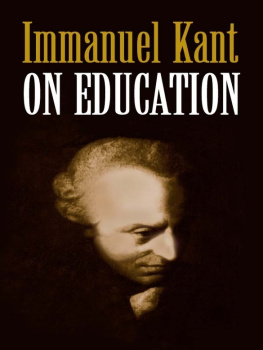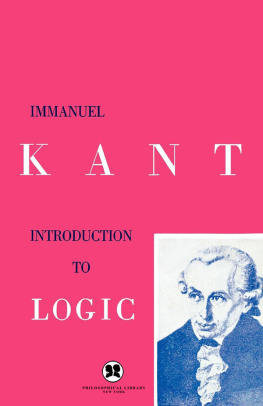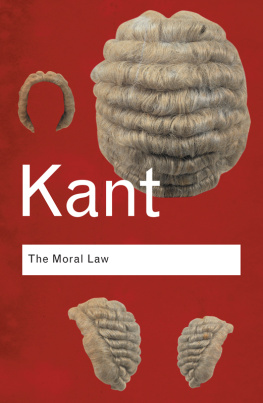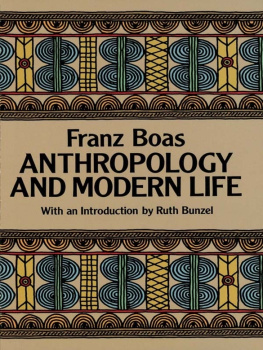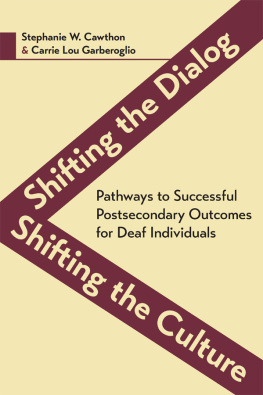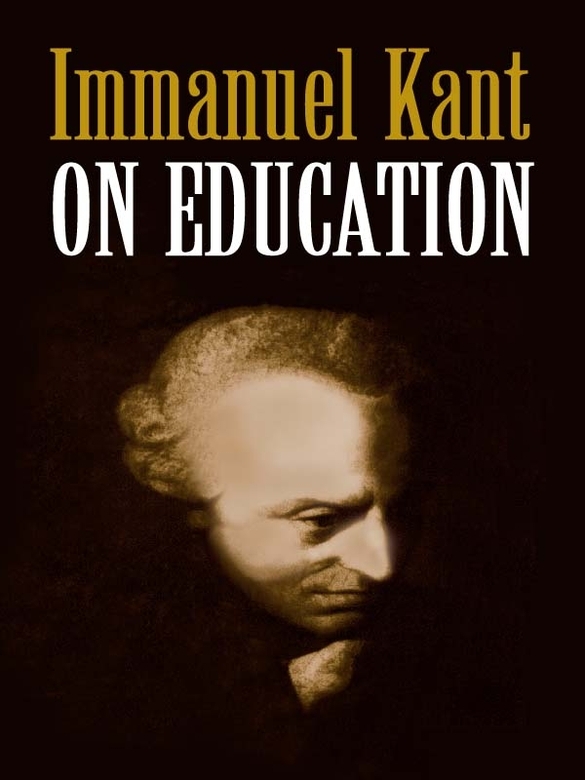CHAPTER I
INTRODUCTION
. MAN is the only being who needs education. For by education we must understand nurture (the tending and feeding of the child), discipline ( Zucht ), and teaching, together with culture. According to this, man is in succession infant (requiring nursing), child (requiring discipline), and scholar (requiring teaching).
. Animals use their powers, as soon as they are possessed of them, according to a regular planthat is, in a way not harmful to themselves.
It is indeed wonderful, for instance, that young swallows, when newly hatched and still blind, are careful not to defile their nests.
Animals therefore need no nurture, but at the most, food, warmth, and guidance, or a kind of protection. It is true, most animals need feeding, but they do not require nurture. For by nurture we mean the tender care and attention which parents must bestow upon their children, so as to prevent them from using their powers in a way which would be harmful to themselves. For instance, should an animal cry when it comes into the world, as children do, it would surely become a prey to wolves and other wild animals, which would gather round, attracted by its cry.
. Discipline changes animal nature into human nature. Animals are by their instinct all that they ever can be; some other reason has provided everything for them at the outset. But man needs a reason of his own. Having no instinct, he has to work out a plan of conduct for himself. Since, however, he is not able to do this all at once, but comes into the world undeveloped, others have to do it for him.
. All the natural endowments of mankind must be developed little by little out of man himself, through his own effort.
One generation educates the next. The first beginnings of this process of educating may be looked for either in a rude and unformed, or in a fully developed condition of man. If we assume the latter to have come first, man must at all events afterwards have degenerated and lapsed into barbarism.
It is discipline, which prevents man from being turned aside by his animal impulses from humanity, his appointed end. Discipline, for instance, must restrain him from venturing wildly and rashly into danger. Discipline, thus, is merely negative, its action being to counteract mans natural unruliness. The positive part of education is instruction.
Unruliness consists in independence of law. By discipline men are placed in subjection to the laws of mankind, and brought to feel their constraint. This, however, must be accomplished early. Children, for instance, are first sent to school, not so much with the object of their learning something, but rather that they may become used to sitting still and doing exactly as they are told. And this to the end that in later life they should not wish to put actually and instantly into practice anything that strikes them.
. The love of freedom is naturally so strong in man, that when once he has grown accustomed to freedom, he will sacrifice everything for its sake. For this very reason discipline must be brought into play very early; for when this has not been done, it is difficult to alter character later in life. Undisciplined men are apt to follow every caprice.
We see this also among savage nations, who, though they may discharge functions for some time like Europeans, yet can never become accustomed to European manners. With them, however, it is not the noble love of freedom which Rousseau and others imagine, but a kind of barbarismthe animal, so to speak, not having yet developed its human nature. Men should therefore accustom themselves early to yield to the commands of reason, for if a man be allowed to follow his own will in his youth, without opposition, a certain lawlessness will cling to him throughout his life. And it is no advantage to such a man that in his youth he has been spared through an over-abundance of motherly tenderness, for later on all the more will he have to face opposition from all sides, and constantly receive rebuffs, as soon as he enters into the business of the world.
It is a common mistake made in the education of those of high rank, that because they are hereafter to become rulers they must on that account receive no opposition in their youth. Owing to his natural love of freedom it is necessary that man should have his natural roughness smoothed down ; with animals, their instinct renders this unnecessary.
. Man needs nurture and culture. Culture includes discipline and instruction . These, as far as we know, no animal needs, for none of them learn anything from their elders, except birds, who are taught by them to sing; and it is a touching sight to watch the mother bird singing with all her might to her young ones, who, like children at school, stand round and try to produce the same tones out of their tiny throats. In order to convince ourselves that birds do not sing by instinct, but that they are actually taught to sing, it is worth while to make an experiment. Suppose we take away half the eggs from a canary, and put sparrows eggs in their place, or exchange young sparrows for young canaries; if the young birds are then brought into a room where they cannot hear the sparrows outside, they will learn the canarys song, and we thus get singing sparrows. It is, indeed, very wonderful that each species of bird has its own peculiar song, which is preserved unchanged through all its generations; and the tradition of the song is probably the most faithful in the world.
. Man can only become man by education. He is merely what education makes of him. It is noticeable that man is only educated by man that is, by men who have themselves been educated. Hence with some people it is want of discipline and instruction on their own part, which makes them in turn unfit educators of their pupils. Were some being of higher nature than man to undertake our education, we should then be able to see what man might become. It is, however, difficult for us accurately to estimate mans natural capabilities, since some things are imparted to man by education, while other things are only developed by education. Were it possible, by the help of those in high rank, and through the united forces of many people, to make an experiment on this question, we might even by this means be able to gain some information as to the degree of eminence which it is possible for man to attain. But it is as important to the speculative mind, as it is sad to one who loves his fellow-men, to see how those in high rank generally care only for their own concerns, and take no part in the important experiments of education, which bring our nature one step nearer to perfection.
There is no one who, having been neglected in his youth, can come to years of discretion without knowing whether the defect lies in discipline or culture (for so we may call instruction). The uncultivated man is crude, the undisciplined is unruly. Neglect of discipline is a greater evil than neglect of culture, for this last can be remedied later in life, but unruliness cannot be done away with, and a mistake in discipline can never be repaired. It may be that education will be constantly improved, and that each succeeding generation will advance one step towards the perfecting of mankind; for with education is involved the great secret of the perfection of human nature. It is only now that something may be done in this direction, since for the first time people have begun to judge rightly, and understand clearly, what actually belongs to a good education. It is delightful to realise that through education human nature will be continually improved, and brought to such a condition as is worthy of the nature of man. This opens out to us the prospect of a happier human race in the future.

